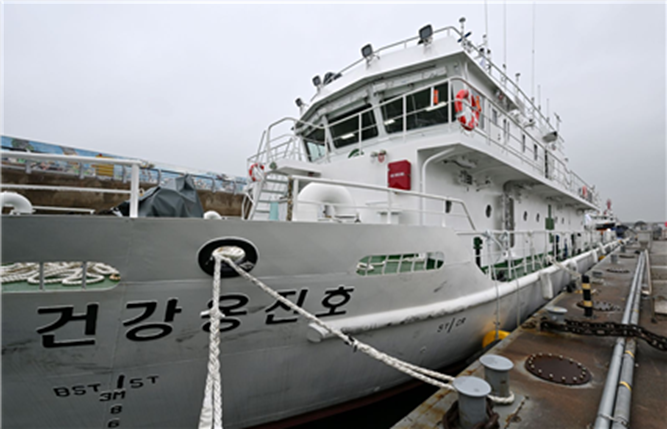- Temporary mobile clinics to begin on June 20–21 at Baengnyeong-myeon and Daecheong-myeon -
- Expanded service areas and medical departments, enabling coverage of all remote islands -
The Incheon Metropolitan City (Mayor Yoo Jeong-bok) announced that its new hospital ship, Geongang Ongjin-ho, will commence temporary mobile clinic services on June 20 and 21 for residents of Baengnyeong-myeon and Daecheong-myeon—areas that previously had limited hospital ship access.
This is the first time a hospital ship has docked at Baengnyeong-myeon, made possible by expanding the service target to six myeon-level districts in Ongjin-gun. Baengnyeongdo Island had been difficult to reach with the aging hospital ship, Incheon 531, which was unable to travel to such distant locations.
During the two days of temporary operation, around 200 residents of Baengnyeong-myeon and Daecheong-myeon are expected to receive medical care.
Due to safety concerns over the aging, 25-year-old Incheon 531, the city decided to build a new hospital ship in 2021.
Launched in April 2025, Geongang Ongjin-ho measures 47.2 meters in length, 8.4 meters in width, and 3.6 meters in depth, with a maximum capacity of 44 passengers. At 270 tons, Geongang Ongjin-ho is more than twice the size of the previous 108-ton vessel and can reach speeds of up to 46 km/h.
The increased size allows it to reach more remote islands, and its higher speed enhances its capacity to serve as an emergency evacuation vessel capable of transporting multiple critical patients.
Unlike the Incheon 531, which mainly served three myeon-level districts and nine island areas1) of Ongjin-gun without medical facilities, the new Geongang Ongjin-ho covers six myeon-level areas and 17 island regions2), enabling medical services to all non-connected islands within the jurisdiction. The service areas include:
1) Deokjeok-myeon (Baega, Mungap, Uldo, Jido, Gureop), Jawol-myeon (Seungbong, Daeijak, Soijak), Yeonpyeong-myeon (Soyeonpyeong)
2) Baengnyeong-myeon (Baengnyeongdo Island), Daecheong-myeon (Daecheongdo Island, Socheongdo Island), Yeonpyeong-myeon (Yeonpyeongdo Island, Soyeonpyeongdo Island), Bukdo-myeon (Sin Island, Si Island, Modo Island, Jangbongdo Island),
Deokjeok-myeon (Deokjeok, Soya, Baega, Mungap, Uldo, Jido, Gureop), Jawol-myeol (Jawol, Daeijak, Soijak, Seungbong)
Medical departments have also been expanded. In addition to internal medicine, traditional Korean medicine, and dental care, the ship now includes physical therapy, clinical pathology, and health education rooms. This allows for vaccinations, chronic disease management and testing, radiology (bone density scans), and health promotion programs.
Geongang Ongjin-ho carries a medical team of seven professionals: three public health doctors, one nurse, one clinical pathologist, one physical therapist, and one radiologist. The ship is scheduled to operate 44 times* per year over 132 days. * Note: For islands with public health clinics—such as Jawol-myeon’s Daeijak, Seungbong, and Soijak, and Deokjeok-myeon’s Mungap, Uldo, Baega, Gureop, Jido—the ship will visit twice monthly. Other areas with health posts will receive quarterly visits.
The ship’s services include ultrasound, bone density tests, X-rays, blood tests, vaccinations, and AI-based cardiac diagnostics. The health education room supports health promotion activities, mobile smoking cessation clinics, oral health education, and mental health and dementia prevention programs.
One local resident, Cho Kang-bu (68, from Bukpo 2-ri, Baengnyeong-myeon), expressed hope after hearing about the ship’s new AI heart screening service.
He remarked, “When I had a check-up in January, everything seemed fine, but recently I felt a slight pressure in my chest, which made me worried. I came to the ship because I heard they can perform electrocardiograms using the latest equipment.”
The AI cardiac screening device (SmartECG-AF) analyzes subtle signals embedded within a 10-second normal sinus rhythm ECG using artificial intelligence, enabling early diagnosis and prediction of heart disease.
Test results are initially reviewed by the local health center’s internal medicine department. If abnormalities are found, patients will be referred to Inha University Hospital’s cardiology specialists.
Moreover, the city plans to collaborate with island-based primary care doctors, private hospitals, and volunteer medical teams to provide specialized care using the hospital ship’s equipment.
Shin Byeong-cheol, Director of Incheon’s Health and Welfare Bureau, stated, “Geongang Ongjin-ho is not just a hospital ship but a ‘mobile health hub’ protecting the wellbeing of island residents. We will continue our dedicated support and attention to these medically underserved areas.”
The official commissioning ceremony for the hospital ship is scheduled for June, after which regular medical services will commence in full force.
